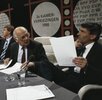Charting Dutch Democracy
Opinion Polls, Broadcasters and Electoral Culture in the Netherlands, 1965-1990
DOI:
https://doi.org/10.51769/bmgn-lchr.7074Keywords:
Media history, political history, Netherlands, electoral culture, opinion polls, broadcastersAbstract
This article was first published as online first on the website of BMGN - LCHR on 16 March 2022. This second version published in BMGN 137:3 has not been changed or revised, apart from the author's bio.
This article unravels the appropriation of electoral opinion polls by Dutch public broadcasters and their deployment in radio and television formats from the 1960s until the 1980s. Rather than engaging with the mediatisation narrative that communication and media scholars use to grasp the media’s use of opinion polls, this article historicises the developments that have led to opinion polls becoming mass media marvels. This article demonstrates that Dutch broadcasters used polls to claim a crucial role for themselves as the intermediaries between political elites on the one hand and the electorate on the other. What is more, this article contends that polls on radio and television were making the political weather as much as reporting on it. Progressive broadcast editors and polling experts appropriated polls as a means to promote the notion of Dutch voters as consumers in an open marketplace, who were no longer bound by traditional loyalties such as religion or class. As such, they boosted new, ‘depillarised’ ways of understanding politics.
Dit artikel onderzoekt hoe Nederlandse publieke omroepen opiniepeilingen gebruikten in radio- en telvisieprogramma’s van de jaren zestig tot en met de jaren tachtig van de twintigste eeuw. Dit artikel gaat niet mee in het ‘mediatiseringsnarratief’ dat veel communicatie- en mediawetenschappers hanteren om dit gebruik te verklaren, maar stelt zich tot doel de opkomst van de opiniepeiling als mediafenomeen te historiseren. Het artikel laat zien dat Nederlandse publieke omroepen peilingen gebruikten om een cruciale bemiddelaar tussen de politiek aan de ene en het kiezerspubliek aan de andere kant te worden. Dit artikel toont bovendien aan dat peilingen politieke ontwikkelingen niet alleen in kaart brachten, maar ook vormgaven. Progressieve omroepredacteuren en peilingexperts eigenden zich peilingen toe als een middel om het idee te propageren dat Nederlandse kiezers consumenten waren in een vrije markt: ze waren niet langer gebonden aan traditionele loyaliteiten zoals religie of klasse. Als zodanig droegen zij bij aan nieuwe, ‘ontzuilde’ manieren om over politiek na te denken.
Downloads

Published
Versions
- 2022-09-30 (2)
- 2022-03-16 (1)
Issue
Section
License
Copyright (c) 2022 Fons Meijer

This work is licensed under a Creative Commons Attribution 4.0 International License.
Authors who publish with this journal agree to the following terms:
a) Authors retain copyright and grant the journal right of first publication with the work simultaneously licensed under a Creative Commons Attribution 4.0 International (CC BY 4.0) that allows others to share the work with an acknowledgement of the work's authorship and initial publication in this journal.
b) Authors are able to enter into separate, additional contractual arrangements for the non-exclusive distribution of the journal's published version of the work (e.g., post it to an institutional repository or publish it in a book), with an acknowledgement of its initial publication in this journal.
c) Authors are permitted to post their work online (e.g., in institutional repositories or on their website) prior to and during the submission process.
Authors are explicitly encouraged to deposit their published article in their institutional repository.











